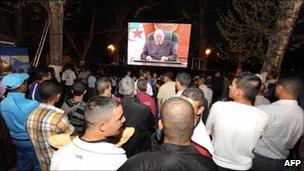Algeria leader Bouteflika pledges constitutional reform
- Published

Algerian President Abdelaziz Bouteflika, who has been in power for 12 years, has promised to amend the constitution to "strengthen democracy".
Delivering a long-awaited speech on state TV, he said a constitutional commission would be created to draw up the necessary amendments.
It was his first address to the nation in three months.
Unrest broke out in January with strikes, marches and rioting echoing protests elsewhere in the Arab world.
Under pressure to amend the constitution and limit presidential terms, the 74-year-old leader lifted the country's state of emergency in February, after 19 years.
However, the trigger for the unrest appears to be mainly economic, especially sharp increases in the price of food.
New laws
Algerians gathered around TV screens to watch the president, who looked frail and spoke in a hoarse voice.
"To crown the institutional edifice with the aim of strengthening democracy, it is important to introduce the necessary amendments to the constitution," he said.
"Active political currents" would join constitutional law experts in drawing up the amendments, he said.
In addition, the electoral law would be "revised in depth", with the participation of "the political parties, whether present [in parliament] or not".
A new information law would be introduced to replace existing legislation under which journalists have been jailed after writing articles critical of the president.
The new law would include "regulations for responsible blogging", the president said.
The current constitution, adopted in 1996, was introduced to strengthen presidential law and ban religion-based parties following Algeria's murderous war between the military and Islamist militants, in which some 150,000 people were killed.
Political analyst Mohamed Lagab cautiously welcomed Mr Bouteflika's speech.
"Acknowledging that political reforms - and not only social and economic reforms - will help to solve the crisis is key," the Algiers University academic told Reuters news agency.
"But Bouteflika did not give a deadline for the reforms he announced and he did not sack the government yet," he added.
- Published24 February 2011
- Published12 February 2011
- Published26 February 2011